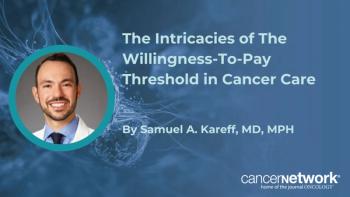
Research Offers Insight on Swallowing and Voice Difficulties in Lung Cancer
Little research has been done on these complications commonly found in lung cancer.
Observed swallowing function and patient-reported symptoms fail to align in patients with small-cell lung cancer (SCLC), according to
“It remains unknown which patients experience dysphagia or dysphonia, and what the impact of these problems are to the patient,” wrote authors, led by J. Frowen, Peter MacCallum Cancer Centre, Melbourne, Australia.
In the pilot study, dysphagia and dysphonia prevalence and health effects were examined in a low-power prospective cohort (n=12) receiving chemoradiotherapy for limited-stage SCLC. Swallowing physiology, risk of aspiration, and esophageal motility disorder were assessed using videofluoroscopy swallowing studies (VFSS). Other data included limitations to eating and drinking, as well as patient-reported swallowing and speaking issues. Data collection occurred pre-treatment and at 1, 3, and 6 months post-treatment.
Pharyngeal swallowing was safe and functional across the cohort, with no patients aspirating. In total, 6 patients had esophageal motility disorders, with 3 patients experiencing this prior to chemoradiotherapy, and 3 experiencing it post-treatment.
In patients, eating and drinking was at its worst within the one month following treatment. Specifically, 1 patient needed a tube, 2 patients needed a specially prepared diet, and 2 needed a diet of a single consistency. However, at 3- and 6-month follow-ups, these and all other patients were consuming a normal or near-normal diet.
Three patients complained of moderate or severe swallowing difficulty at 1 month post-treatment, although oropharyngeal dysphagia was absent while on videofluoroscopy swallowing studies. These patients were administered an esophageal radiation dose of ≥15.7Gy, with a maximum dose of ≥42Gy. In these patients, swallowing problems were mild or less irritating at 3- and 6-month follow-ups. Three other patients complained of moderate or severe swallowing difficulties at 3 and 6 months post-treatment, yet no relationship with radiation dose was observed in these later reporters.
The worst scores in patient-reported voice difficulties were noted at one month post-chemoradiotherapy, and were experienced by a small number of patients. These patients continued to complain of voice difficulties at 3 and 6 months with regard to all physical, functional and emotional realms. Overall, patient-reported voice difficulties varied among all patients.
“Although patient numbers are small, this study identified discordance between observed swallowing function and patient-reported problems, which may have significant clinical implications for the management of patients with SCLC, as well as identify important issues for future research,” concluded the authors.
Newsletter
Stay up to date on recent advances in the multidisciplinary approach to cancer.
Related Content




Evaluating the Cost-Effectiveness of Immunotherapy in Lung Cancers











































